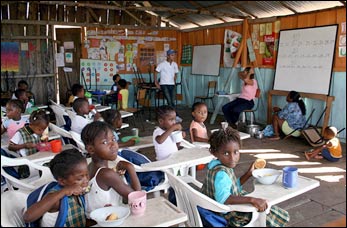New UNHCR initiative grows out of Colombian swamp village project
New UNHCR initiative grows out of Colombian swamp village project

FAMILIAS EN ACCIÓN, Colombia, September 26 (UNHCR) - At the beginning of this year, Lucia* and her family found sanctuary in a squalid, dilapidated settlement built on mangrove swamps near the Colombian port city of Tumaco.
Alerted by church officials, UNHCR staff visited Familias en Acción, home to around 100 families displaced by violence in south-west Colombia's volatile Nariño Department. They were appalled at the conditions and believed the residents faced grave health and safety risks.
"It was one of the most heartbreaking places I had ever seen, a mixture of very harsh environment and complete lack of assistance," said UNHCR Community Officer Saskia Loochkartt, recalling her first visit.
The refugee agency was determined to do something to improve conditions in the settlement (barrio) and UNHCR's work here would inspire the launch Friday of a new programme - dubbed "Listen to Change" - to provide protection and improved living conditions in some of Colombia's most vulnerable communities.
For Lucia, her husband, two children and young nephew, Antonio, Familias en Acción was an oasis of peace and security compared to the fishing community they had fled from further up the Pacific Coast after Antonio's father was murdered by members of an irregular armed group. But they did have concerns.
For starters, the settlement lacked vital utilities such as electricity and clean water when Lucia arrived on New Year's Day. But most of the residents, as registered displaced people, were entitled by law to basic services and rights.
And as newcomers, Lucia and her husband had to build their one-room shack at the back of the barrio, right by the water's edge. "At the beginning we were scared at night because when the tide rose, the water came right up to where we sleep," said Lucia. She was worried that their youngest child would drown.
The muddy paths through the swamp became almost impassable when the water was high, while the incoming tide flushed waste into the houses. Common health problems included malnutrition and gastro-enteritis among small children.
UNHCR contacted the local authorities to put together an urgent action plan to bring in sanitation, electricity and other basic services. For its part, the agency committed to install 16 sanitation units, each consisting of a 500-litre water tank, two lavatories and a septic tank. The community has started the work, under the supervision of UNHCR partner Solidaridad Internacional, which is also running workshops in hygiene and food preparation.
The municipality of Tumaco, meanwhile, has introduced electricity and put sand and gravel on pathways to drain excess water. The community has built a rudimentary school where the children receive one meal a day from the Social Ministry. The improvements have had an immense impact on the community.
"It worked because everybody has got involved," Jean-Noël Wetterwald, the UNHCR representative in Colombia, explained. "Our aim was to galvanize a response from the local and national authorities, starting with a small contribution and a lot of coordination from us."
Based on this model, UNHCR developed Listen for Change, a portfolio of small projects seeking to make a rapid difference in displaced people's lives. The first phase consists of 22 projects and UNHCR is appealing for US$600,000 to be able to implement them as soon as possible to meet urgent needs.

In Familias en Acción, meanwhile, eight-year-old Antonio has started playing football with the other kids. He is a very quiet child, Lucia said, adding that he has not been the same since his father was shot dead in front of him. But little by little he is improving.
"When I see him get sad and angry, I tell him not to hate because hate is what got us here," the young woman said. "I also tell him he must keep hoping, because he only has to look around to see that things are getting better."
* Name changed for protection reasons
By Marie-Hélène Verney in Familias en Acción, Colombia








